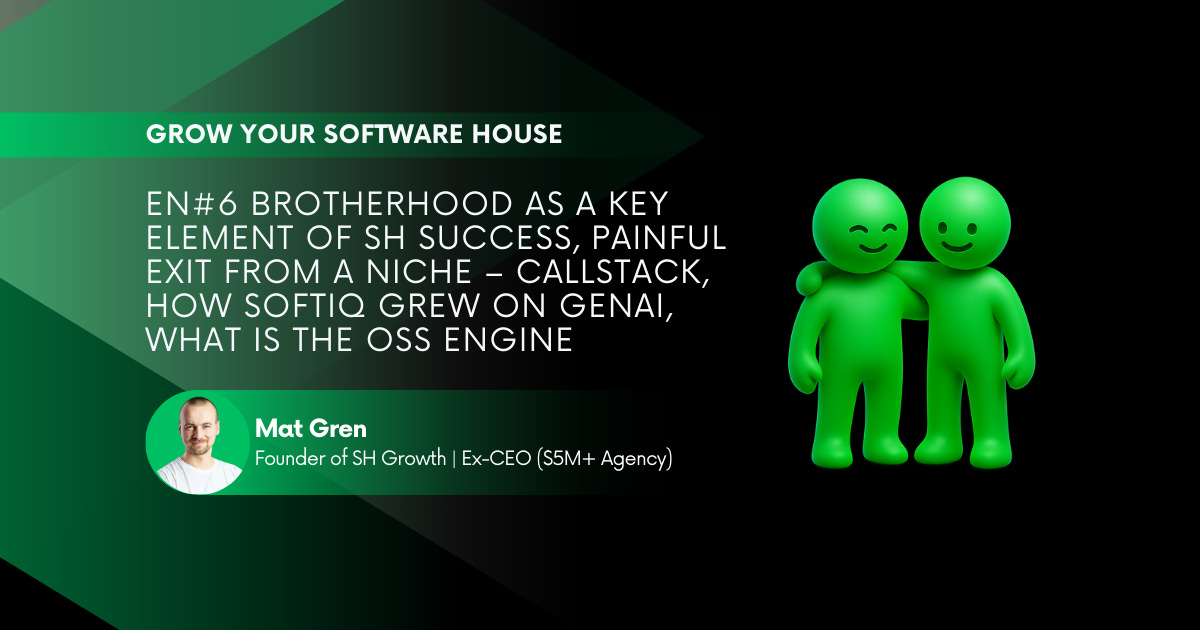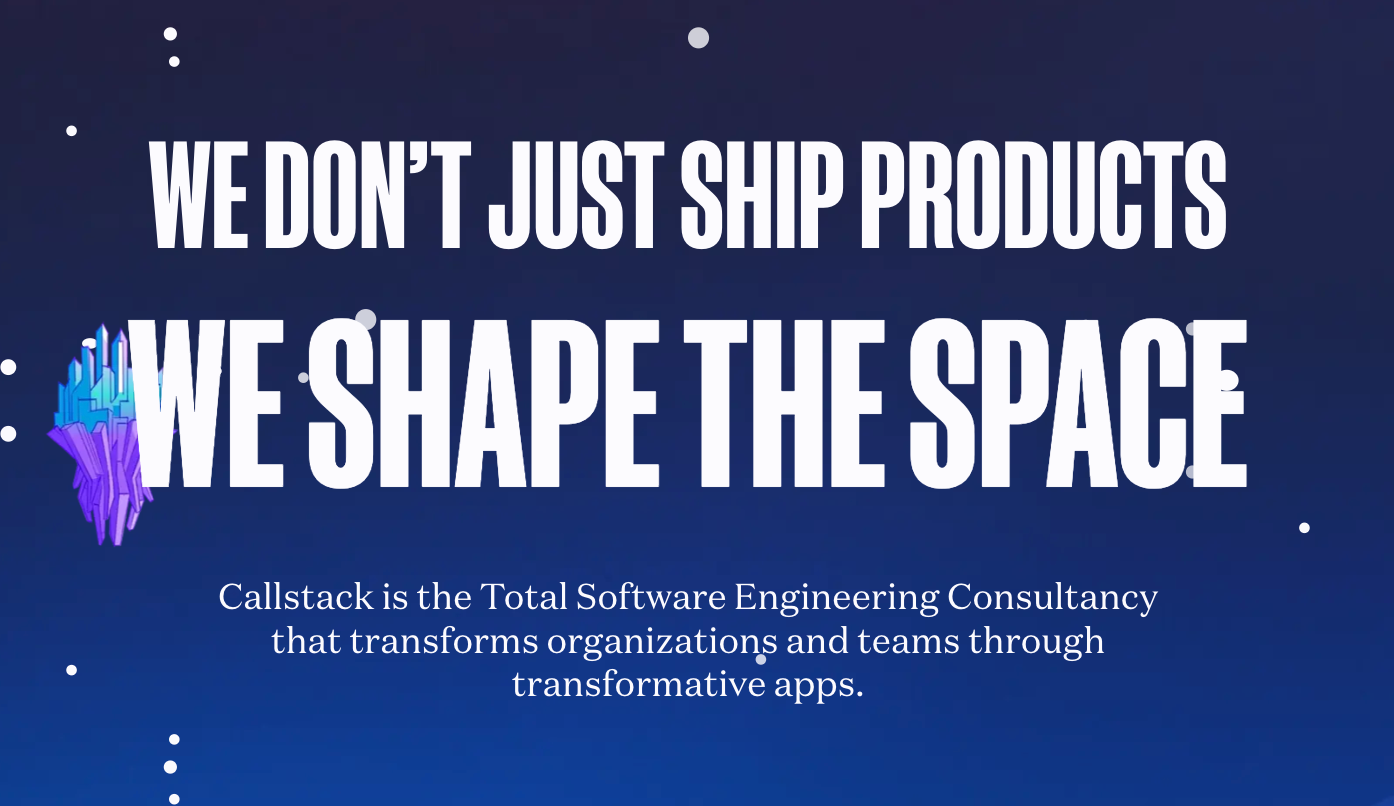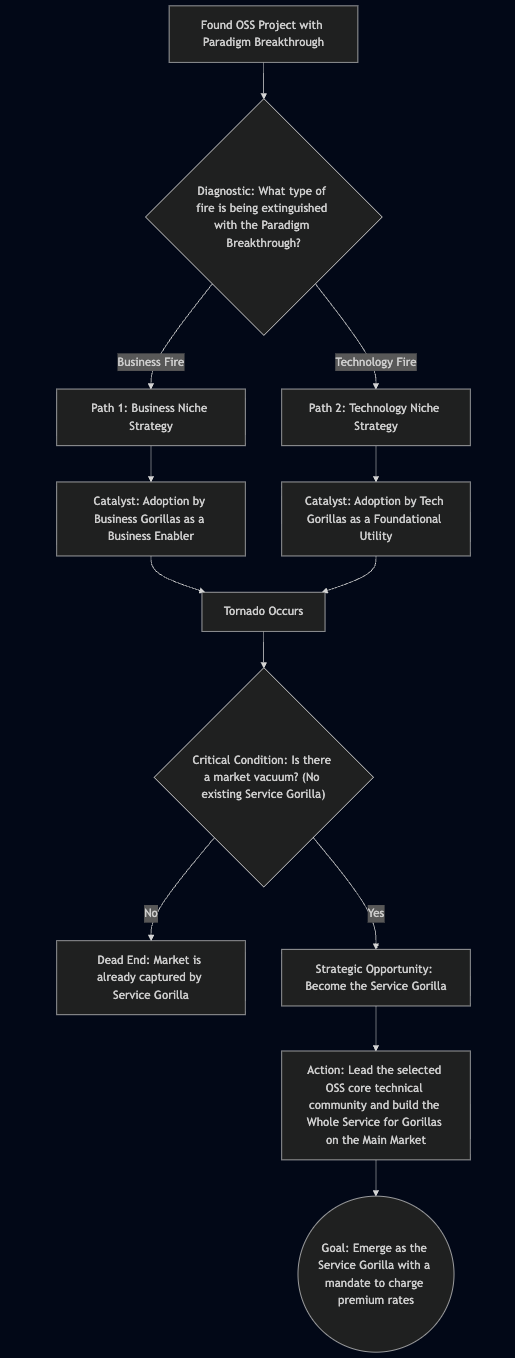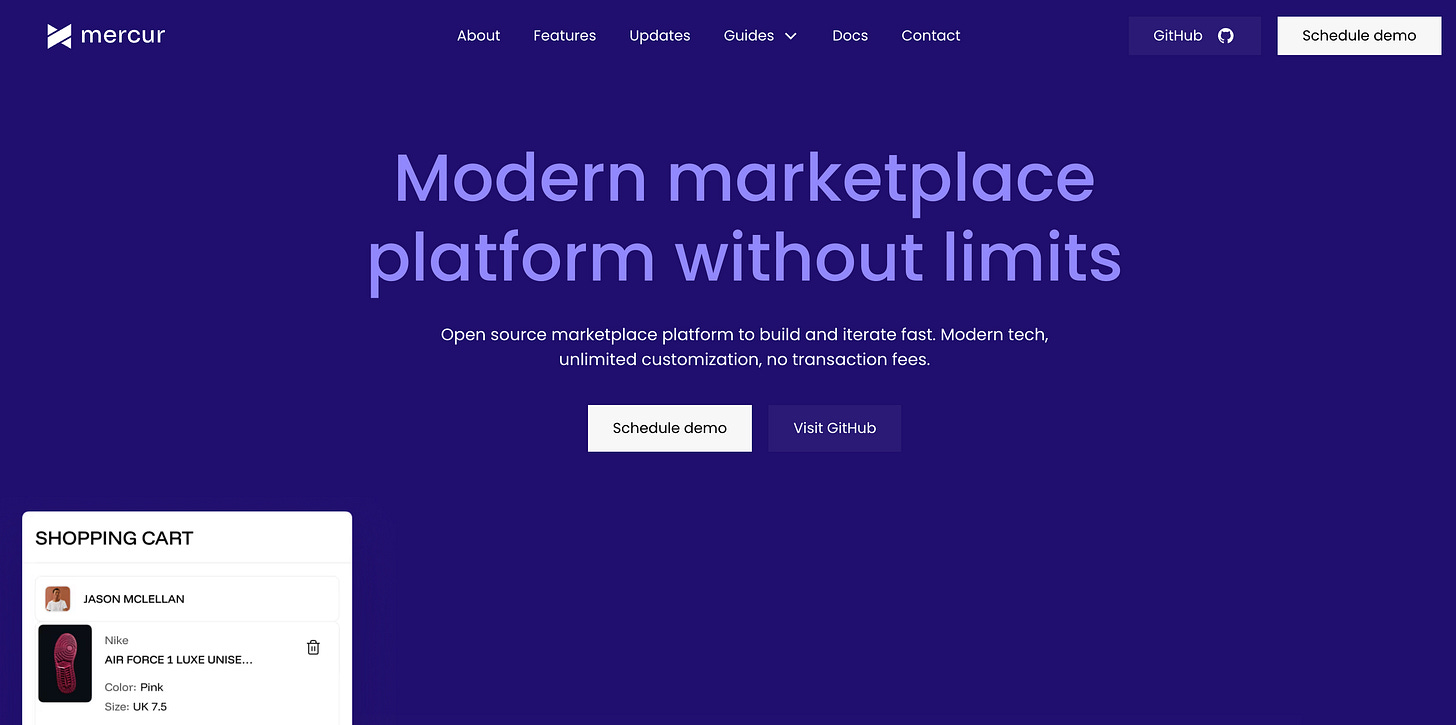Brotherhood as a key element of SH success, Painful exit from a niche – Callstack example, How SOFTIQ grew with GenAI, What the OSS Engine is in Callstack and Rigby
Grow Your Software House newsletter are methods, GPT tools, analyses, and recordings that help software houses discover their growth engine.
Hi! My name is Maciej Greń, and for 17 years I’ve been helping Software House companies grow. Grow Your Software House is a newsletter with a free section on LinkedIn, expanded here on Substack with paid analyses, knowledge, tools, and videos showing how to stop wandering and start systematically developing your Software House.
In today’s issue:
Brotherhood as a key element of SH success
Exiting the niche where your growth engine operates can be painful – Callstack example
GenAI Growth Engine – how SOFTIQ built scalable AI-driven sales in the Public sector
What is the Open Source Growth Engine – Callstack and Rigby example
The knowledge shared in this newsletter should be used with caution and at your own responsibility. I frequently borrow phrases from English—please forgive me; I do it intentionally because we use them constantly in our daily work.
Brotherhood as a Key Element of SH Success
Paul Graham, one of the founders of Y Combinator, emphasized that one of the main reasons for rejecting applications is the fact that a startup has only one founder, though this is not an absolute rule — solo-founders are sometimes accepted, but rarely. Tomek Karwatka recently said something similar in an interview. It’s no coincidence that many of the companies they incubated began in Wrocław. It’s not the beauty of the city, but the proximity of founders that is key. Why is physical proximity so important? Because when things get tough, when intense conversations happen, they need to be built on personal relationships.
Your co-founder can be your wife, a friend, family, or an acquaintance. On the “family photo,” family usually looks best, which is why many people wrongly assume that a co-founder should be a stranger. We often avoid building close, friendly relationships, yet it’s one of the superpowers that matters immensely. A friend is someone who, above all, loves us. Yes, love is a rather dangerous word in business, but those who truly have such a friend in their company know what I mean. This is someone who cares less about money and more about their relationship with you. Someone who will support you through hardships and tell you the honest truth when they see you heading in the wrong direction.
The degree to which such a co-founder is underestimated is, unfortunately, lethal. First, I often see companies entering equity relationships and calling someone a co-founder when there is no real bond with that person. After all, business doesn’t have to go hand-in-hand with “love,” right? At the end of the day, we all want to make money, and that should be enough to keep us together?
Well… the problem is that when the money is less than you expected, or a better opportunity appears for your co-founder to build a better business with someone else — what will keep them with you?
If you have no bond, you don’t enjoy spending time together outside work, and you lack a shared conviction to move in the same direction, then unfortunately situations like this often lead to:
Negotiations over equity: “or I’ll leave.”
Pressure to pivot “into something more profitable right now.”
Expectations for a high salary: “I have other offers, I could leave.”
Sadly, it turns out that what you’re building together depends on an illusory transaction in your co-founder’s mind, an expiry date that is inevitably approaching, and you have no way to “pay,” while carrying a ton of stress.
And what will motivate you to keep working when a cold sweat wakes you up at night and you fight paralyzing thoughts until morning?
These are truly hard moments, almost impossible to go through alone. A co-founder who walks with you through the dark valley and restores your faith is priceless.
Of course, sometimes your co-founder must leave for objective reasons. In my life, I had one co-founder who is still my friend today, though we had to part ways in very difficult circumstances when we both had burned through our savings and naturally couldn’t move forward together. What’s beautiful is that we’re still in touch, and no matter how long we go without speaking, whenever we reconnect there’s always that sense of “brotherhood.”
Having a co-founder with whom you share a deep bond is crucial at every stage of building a company.
A Co-founder Doesn’t Have to Hold Equity
People who support you and have been “on the bus with you from day one” don’t necessarily have to be shareholders. One of the huge mistakes founders make is assuming that key employees without equity will never be as committed as shareholders, so to fully engage them you need to give them shares. This is a fatal assumption leading to poor decisions:
Offering equity to key employees who don’t care about shares but value the shared vision, respect, and friendship kills a perfectly functioning relationship and turns it into your constant expectations and complaints: “now you’re a shareholder, so you should do this or that.”
Brotherhood in a relationship is more important to many people than equity. Undervaluing the potential of brotherhood in working with key employees and inserting managers between you weakens your collaboration.
Replacing brotherly relationships with purely business ones — “showering” key employees with money, hoping it will motivate them more. What motivates them is working together, not money, which comes and goes.
Introducing OKRs and other operational systems implemented by external consultants who destroy your partnership by “measuring performance,” ignoring the complex aspects of your prior agreements and a long-standing effective collaboration model built on a deep understanding of your mutual needs.
Key employees need appreciation and a deep connection with the founder. It doesn’t have to be friendship; sometimes admiration, alignment of ideas, and values are enough. This is the case with Elon Musk, who, due to Asperger’s, doesn’t build relationships the same way more relational people do. Through his attitude, dedication, ambition, and charisma, he creates a sense of elitism, mission, and deeper meaning. Many companies lack this, which is why people long to work for Elon’s companies.
A support team for whom being together matters more than the fastest ride in one direction is key. The fact that you’re on the bus together is enough for them, even if the well-equipped bus temporarily becomes an old model. You’ll still be in it together and can’t imagine riding with anyone else.
When Brotherhood Breaks — 5 Deadly Sins
There are a few situations where a seemingly strong brotherly bond can be quickly severed. Below are things I’ve personally witnessed in my work with companies — the five deadly sins that permanently, sometimes irreversibly, destroy a brotherly bond with a co-founder:
Ignoring heartfelt requests — When your co-founder sincerely asks you for something important and you ignore or dismiss it. If they’re asking, they’ve hit a wall. Rational arguments don’t work; they’re appealing to your relationship, hoping you’ll come to your senses. Often it’s a silent cry that gets ignored. In aggressive growth or survival mode, it’s easy to miss such signals, but this systematically kills the relationship.
Ordering instead of asking — “I’m the boss here.” Instead of a request, you use the argument of power, authority, or title, forcing your co-founder to do something against their will while ignoring their concerns. This destroys the bond and reduces your co-founder to a task executor.
Publicly undermining them — Attacking your co-founder publicly, taking away their sense of self-worth. Public arguments and questioning their competence hurt deeply. I’m not talking about having different opinions on a topic — I mean attacks that wound them.
Breaking agreements out of greed — Not fulfilling arrangements with your co-founder despite being able to, acting from a position of strength. Greed can lead you to betray your co-founder. Using your power against them kills the relationship.
Going behind their back — Doing things that undermine the very foundation of trust. Your co-founder trusts you and assumes you trust them. If you sabotage their work behind their back to avoid conflict, act inconsistently, or break trust in other ways, they cannot comprehend it. This disappointment and frustration, combined with a lack of understanding of your actions, quickly destroys the relationship.
Of course, the problem isn’t always you. Your co-founder might be influenced by various voices, thoughts, or fears, leading to emotional imbalance or a drop in professionalism. That may tempt you to take shortcuts — do things behind their back, avoid confrontation or discussion. Remember: in a brotherly, loving relationship with your co-founder, you can simply invite them for bowling, billiards, jogging, PlayStation — whatever you did together when you were close — to evoke those memories and use the bond as a platform to open up. Listening to your co-founder allows you to return to the depth of the relationship and clear the air.
One brutal truth, however, is that this cleansing of the relationship is very hard to achieve when you’re far apart. Physical presence, being together in daily life, is a powerful platform. Founders severely underestimate this, hoping that everything will be fine and that remote co-founding sometimes works. But if you look at the history of companies, you’ll see that co-founders and key employees spend time together daily and have a strong bond. Not because online work is impossible, but because they know their bond builds trust and the sense of “being on the same bus.” That sense gives meaning, strengthens the bond, and adds energy for the daily boring, tedious, sometimes disappointing work.
GenAI Growth Engine – How SOFTIQ Built Scalable AI-Driven Sales in the Public Sector
GenAI is on the lips of practically every business. Everyone looks at their tasks and processes and wonders: “Is this a good candidate for using GenAI?”…
GenAI is undeniably a Tornado, or even what I call a Cyclone, because a Tornado usually transforms a horizontal niche, whereas here both horizontally and across many vertical niches at once, the promise of time savings, process improvements, and quality gains through GenAI makes everyone think about it.
Even pragmatists in large companies — who usually wait for a “new standard” and a “complete product” — are trying to stay on top and sculpt something out of AI. But they quickly hit the entry barrier because GenAI technology is still, for them, undeniably an incomplete product. After all, how do you call something “complete” when it can generate beautiful essays and yet in the next moment make mistakes in simple math equations? (Yes, I know there’s GPT-5 Pro used for scientific research, but it suffers from similar fundamental limitations as the whole family of LLMs.)
Thus, we have a GenAI Cyclone — an intensified Tornado.
Even though pragmatists bravely stand in organizations and say, “AI is still far from being usable here,” they feel pressure from management because “the competition is already boasting that thanks to AI they’ve cut costs by X%.”
Pragmatists have to roll up their sleeves and… wade through the mud. That’s the last thing they want to do. They weren’t hired to do R&D. They were hired to deliver value in the area they’ve been studying, working, and building their competencies in for years. Now they dive into the world of AI and drown in a sea of solutions and platforms — a real Hyde Park.
Meanwhile, SOFTIQ, a software house from Gliwice, builds its growth engine on… public procurement contracts. Not just in Poland, but abroad as well. They do it manually at first, but when the first LLMs appear — they start experimenting. They try to optimize their bidding process. They improve it for themselves, not to turn it into a product — that wasn’t their goal. They grow — contrary to the global trend in the software house market. While SHs are laying people off in 2023–2024, they are hiring. They enhance their internal AI platform for applying to public tenders, and thanks to AI they expand into other countries — Scandinavia, Iceland, the UK.
Their product matures and inevitably the question arises:
Why should only SOFTIQ be its sole user?
They discover a vertical niche where by giving access to their platform, they won’t create direct competitors for themselves, but rather help companies from another segment grow — construction.
This is how Przetargi.io was born, a service that radically accelerates the tender application process for companies in that sector. The software house used its internal tool to reach those pragmatists who, under pressure from their boards to “do something with AI,” suddenly see SOFTIQ as a savior — with a ready-made product tailored to their niche.
Just a few months after launching the platform, SOFTIQ already has over 100 clients on it. Look at their pricing — it’s cheap. How does an SH make money then? Clients need customization. It’s the same here.
The platform confirms that the system works. It’s like an expanded demo that helps pragmatists in a given segment gain trust and overcome resistance.
And this is only the beginning. Every company has its internal document structures, procedures, etc. Here, since SOFTIQ is the leader in this tool, they can charge completely differently — based on delivered business value, not hours worked. It’s a textbook example of a vertical product-based growth engine for a specific industry niche.
Building a tool in a vertical niche — even just a prototype — is, in my opinion, an ideal way for software houses to sell custom GenAI development.
It’s much easier to go into one niche and build a reputation as a leader there, and it’s also easier to acquire subsequent clients when the first few projects are done “at cost.” This is the Bowling Alley strategy from Geoffrey Moore’s book Inside the Tornado.
However, remember that doing projects in a given niche is not yet a growth engine. The engine should lead to leadership in that niche. What does that mean?
If you really want to follow SOFTIQ’s path, you also need to roll up your sleeves and build a new brand in that niche — a domain expertise brand that delivers business value, not technological value. You need to want to become a leader in that niche. Without this, you’ll just be another SH with a few at-cost projects that aren’t properly leveraged to build leadership. SOFTIQ builds this leadership both in the public sector and in a given industry niche.
Which niche do you want to lead in?
Exiting the Niche Where Your Growth Engine Operates Can Be Painful – Callstack Case Study
The Open Source Growth Engine (OSSGE) uses an open-source project as a platform to build leadership for a service company (Software House). Sounds simple? Not quite. According to analyses, there are tens of millions of OSS projects, but only a tiny fraction can directly serve as the heart of a Software House’s Growth Engine.
What makes an OSS project ideal for becoming a SH growth engine?
An OSS project is essentially a technology. For it to become the heart of a growth engine, it must change the paradigm in a niche and trigger a Tornado (as described in Geoffrey Moore’s Inside the Tornado). A Tornado forms when two powerful forces collide:
The drive to maximize profits (the primary force pushing every business forward).
The resistance of the existing paradigm (tools, people, lack of access to resources).
Normally, these forces don’t meet because there’s no outlet for the pressure. Pragmatists in the mainstream market see a new technology but say:
“It’s too complicated, too risky, and there’s no support.”
This resistance is stronger than the promise of profit. That’s the Chasm and Bowling Alley phases in Moore’s model: innovators and visionaries experiment with the tech, proving its value. Pressure builds, but there’s no eruption yet.
When a complete service or OSS product appears that pragmatists can adopt safely, the Tornado begins. A de facto standard emerges, eliminating the risk of “choosing the wrong option” for mainstream decision-makers.
At that point, the entire market — like one organism — rushes to adopt the new standard, as sticking with the old becomes riskier than change.
A classic example: React Native in 2016–2020.
The trend of building custom mobile apps collided with frustration over maintaining two separate apps (Android/iOS). Solutions existed, but pragmatists resisted. PhoneGap never became a standard. React.js, however, was already mainstream, backed by Meta (Facebook), and had won the frontend Tornado. This created a huge pool of technical leaders familiar with React who wanted to extend its paradigms to mobile apps.
During the rise of React Native, Mike Grabowski heavily contributed to OSS projects, one of which made it into React Native Core. This placed him and Callstack at the center of global tech leadership, alongside Meta. As React Native overcame pragmatist resistance, Callstack became the go-to service provider — the “Service Gorilla” — bridging businesses to the new tech. Meta never intended to own that service niche; open-sourcing was part of its strategy.
Everything scaled beautifully until 2024, when Callstack tried to expand beyond its Tornado niche into general React.js/Main Street services.
They redesigned their website and messaging… and it didn’t work.
As ex-CSO Krzysztof Pawlak put it:
“We pulled back faster than we decided to go forward.”
Why? Because Callstack’s brand strength in React Native attracted clients outside its premium niche. React.js Main Street is a commodity market with downward pricing pressure — the pool of developers explodes, and premium margins vanish. Callstack hit a wall. High-margin (80–90%) projects were no longer within reach. Their old brand kept attracting clients, but outside React Native, they weren’t seen as premium.
This shows Callstack’s OSS Growth Engine revolves around React Native. Even the company’s sale for ~0.5B PLN didn’t lead to Mike’s exit — his role as a key community leader makes him indispensable for new owners.
What Is the OSS Growth Engine in Callstack & Rigby?
Callstack’s success as a commercial custodian for React Native wasn’t accidental; it’s a repeatable OSSGE pattern — a strategy for building market leadership around a breakthrough OSS project.
It starts with diagnosing which paradigm the OSS project breaks:
Does it solve a tech bottleneck (like React Native)?
Or a deep business problem (like Medusa.js in complex B2B commerce)?
The answer defines your go-to-market.
In tech paradigm shifts, the pain is in IT (inefficiency, lack of skills). Pragmatists adopt only after a Tech Gorilla (like Meta) signals stability and future viability. When the Gorilla endorses the tech, the Tornado begins. That’s when a service company can become the Service Gorilla — the leading commercial implementation partner.
In business paradigm shifts, the OSS project addresses a strategic industry pain. Here, the signal must come from Business Gorillas — respected industry leaders (Heineken, Mitsubishi) who validate its business value. The path is slower — Bowling Alley strategy: niche by niche, building trust.
Why Tech Community Leadership Matters
Regardless of the path, OSSGE success hinges on:
A market vacuum (no dominant Service Gorilla yet).
The company’s ability to become not just a partner but an active OSS contributor & steward, earning a silent mandate from the market to define the tech’s future.
Ongoing leadership in the OSS community to maintain that position.
Who Is the Decision-Maker for a Software House Using an OSS Growth Engine?
In the diagram above, I showed the heart of the OSS Engine. What’s very important is that the type of new paradigm determines to whom the Service Gorilla (meaning your Software House, if it wants to leverage the OSS Engine and become an undisputed leader) directs its services and what language it speaks.
If the paradigm is technological, the main decision-maker is the technology leader who personally selected the OSS project for their company and is now looking for the best ways to implement their project.
If the new paradigm originates from business needs, the Service Gorilla will instead communicate its services to business decision-makers.
This is very clearly visible when we compare the homepages of Callstack and Rigby.
Callstack Website (callstack.com)
Callstack’s slogan “Your React & React Native Development Experts” sounds rather… ordinary.
The most valuable space at the very top of their site explains why:
“Callstack was founded a few months after React Native was released to support developers and companies looking to use it, without having to worry about the complexity of building native apps.
Since then, we’ve helped teams of all sizes succeed with React Native, while contributing to the core framework and maintaining key open source tools.”
The messaging is aimed 100% at the technical community, which already knows them very well — they read their e-books on React Native app performance, attend their conferences, and use their libraries.
Any company wanting to invest in migrating to this technology and struggling to build those competencies internally will naturally come to Callstack.
Rigby Website (rigbyjs.com)
It’s different with Rigby, a company that serves as a model Service Gorilla for the open-source project Medusa.js — as Medusa.js’s CEO himself points out.
Rigby focuses on the business client; its website does not put “Medusa Experts” as the main message. Instead, the focus is on delivering business value, with Medusa simply being the best technology for Rigby to achieve that goal.
Mercur.js (mercurjs.com)
Interestingly, Rigby has created its own OSS product called Mercur.js, which is a textbook example of the strategy described in Inside the Tornado.
At the moment when multiple business niches start adopting a given technology, the Service Gorilla (Rigby) delivers the “Whole Product” — in this case, a platform for building B2B marketplaces on Medusa.js.
Mercur and Rigby are consistent — they continue to communicate with the business decision-maker because they understand which paradigm (business) their technology breaks.
For many, this may seem like a small detail, but it’s absolutely critical.
Why Messaging Alignment Matters
Who we communicate our services and products to also determines what kind of insights (gathered from our work with this type of client) we use to educate them.
If you are breaking a business paradigm, but fail to understand this and communicate using only technical values, you’re effectively telling the market:
“We’re not ready to be the Service Gorilla because we don’t understand you.”
At best, the client’s development team may carry you on a platter to their business decision-makers — but that is a very long and painful path, during which the dev team may decide:
“Actually, we can just do this ourselves without you.”
There are still several other ways in which the OSS Growth Engine can effectively and sustainably build a competitive advantage for a Software House.
I’ll write about these in future issues of our newsletter.
Afterword
Identifying which OSS project is ideal for a given SH and moving the company from level 0 to 10/10 is my specialty.
If you’re a Software House that is either “sitting on a golden egg” (i.e., you have a popular OSS project in your hands) or want to direct your growth strategy toward an OSS project — feel free to contact me at mat@shgrowth.com.








